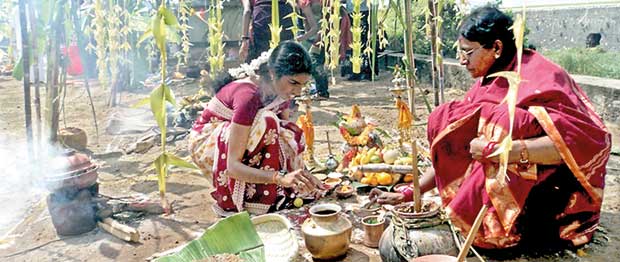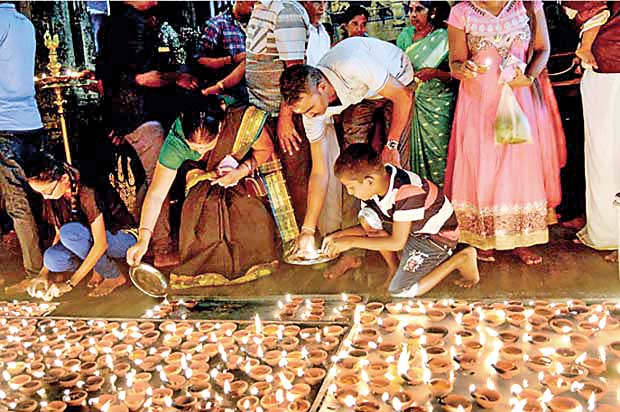Reply To:
Name - Reply Comment
Thai is the auspicious month of the Tamil calendar and Pongal is the dish of a concoction of rice, dhal of split pulse, juggery and milk. Thai Pongal is, therefore, the feast of the month of Thai. This is an occasion celebrated by Tamils all over the world on the first day of their calendar. This is one of the merriest and most popular festival of Tamils to announce the arrival of a plentiful harvest.

Thai Pongal is the feast of the Sun, the forerunner for a successful harvest, which in actual fact should be held after the Northern Solstice. The day after the Northern Solstice is December 23 but the Hindu astrologers have fixed the festive date to coincide with the first day of the first month of the Tamil calendar. This day normally falls between the 12th and 16th of the month of January in the Gregorian calendar. This year the festive day falls on January 14th.
Rituals of this family festival commence with the boiling of a pot of rice on the front doorstep of the house. All the members of the family gather around the pot of rice. All of them enjoy the occasion wishing one another with the delightful cry Pongal, Pongal Auchu! We are getting exactly what we expect. It is boiling, It is boiling
In actual fact, Thai Pongal is a Thanksgiving Ceremony. It is the Sun which brings prosperity in agriculture. Hence, the Sun deserves thanks and respect from the farmers. Animals including the cow, ox and buffalo help them immensely in the farm. Hence the farmers thank the sun, the nature spirit, forerunner of a plentiful harvest. They also thank the farm animals for their assistance in providing a successful harvest. While the farmers thank the Sun and the farm animals the rest of the population take this opportunity to thank the farmers for the production of food. Thus the farmers thank the Sun and the farm animals and express love and affection they rightfully deserve.
There are customs connected with Thai Pongal which are means of expressing joy and happiness in anticipation of a new life for everyone blessed with plentiful harvests. The day of Thai Pongal begins at dawn. Every member of the family gets up in time for participating in this family festival. They bathe and dress and gather around the front doorstep or in the front garden (mutt ram), elders to cook the Pongal including rice, dhal, jaggery or chakra (brown sugar) or katkandu (sugar candy) and the other members of the family to assist in various ways. A flat square pitch is made and decorated gracefully with kolam (decorative patterns are drawn on the doorstep) and exposed to the direct sunlight. This is done as offerings to the Sun.
The kolam is drawn using various powders made of various flours and other items made from grains. Since the preceding month, Markazhi (December-January) is topically rainy season, ants and other insects tend to swarm into the huts of farmers in search of food. This kolam tradition serves two purposes. One to feed the ants and other insects at the same time keeping them at bay till Sun arrives. A special fire-place is prepared using three bricks or three rubbles in the front of the house. Fire-wood supplied earlier is used to set fire at the auspicious moment. The cooking ceremony begins by placing a pot of water on the hearth.
A senior member of the family, mother, grandmother, father or the grandfather conducts the cooking. The other members of the family assist him or her. Those who cannot assist or participate in cooking watch the event with interest. When the water is boiled sufficiently they put rice into the pot. It is usual for a senior member to put three handfuls of rice into the pot. This is a ceremonial event. Those who can afford prepare special dishes adding other ingredients. The other ingredients of this special dish are chakkara (brown cane sugar/jaggery) katkandu (sugar candy), milk (cow’s milk), roasted green gram (payuru)), raisins, cashew nuts and some pods of cardamom.

When the meal is ready family members lay plantain (banana) leaves on the floor and they put the pudding on them. Before taking the meals they pray for some time and thank the Sun, the nature spirit, the farmers and the farm animals. After the prayers, the meal is served among family members with fruits such as Banana and Mango. Although Pongal is cooked in every house it is a usual custom to share the Pongal with relatives, friends and well-wishers. Presumably, this is done as a token of friendship, closeness and unity. Whatever it is, sharing each other’s Pongal is an important feature in the event. Some Hindu scholars believe that rice is ceremonially cooked on the Pongal day because of its importance as a potent symbol of auspiciousness and fertility.
The morning hours are spent with the family members and close relatives including neighbours and in the evening they visit relatives and friends and attend to cultural events. After Pongal at home, the family then moves to their family temple which is usually very close to their house for the Bhairava Pongal.
Farmers give special regard to animals and hold them in high esteem. Hence the Thai Pongal Day is devoted to thanking the cattle. As a mark of gratitude, they bathe the cows which provided them with milk, oxen used to draw carts and buffaloes used to plough the land. After bathing the animals they paint their horns in various colours, red, blue, yellow and green. Their foreheads are smeared with turmeric and Kumkum.
They are also garlanded. Poojas are offered on behalf of them and part of the Pongal is given to them. Thai Pongal is also an occasion for the family reunion and a chance to get together. Old animosities and rivalries are forgotten. Hostilities are healed and reconciliation effected. Thai Pongal is a feast of freedom, peace, unity and compassion crystallized in the last hymn on unity in the Indian spiritual text the Rig Veda. Thus love and peace are the central themes of Thai Pongal.
Generally, the main purpose of this festival is to encourage social cohesiveness, the building of unity and harmony among the people and most importantly to recognize the services rendered by the farmer who provides food to the universe not forgetting the nature spirit, the Sun whose blessings are inevitable. Farm animals that provide immeasurable services in agriculture deserve our love and affection.
"The kolam is drawn using various powders made of various flours and other items made from grains"
Thus the dawning of Thai is a preclude in fortune, happiness and prosperity not only for a particular group but also for the entire rice eating community. The first reaped harvest is offered to the Sun God by way of being grateful for the blessings in agriculture and in anticipation of better prospects in time to come.
The Thai Pongal festival can also be called an occasion for conveying the relationship between life and the environment. Appreciation of the assistance provided by the natural spirits and expressing love and affection to farm animals for their valuable contribution in making food production efforts successful are noble qualities. Let us wish in the name of Humanity that we belonging to various social groups could develop mutual understanding and fraternity among the communities living in this country based on human love as are the objectives of Thai Pongal.